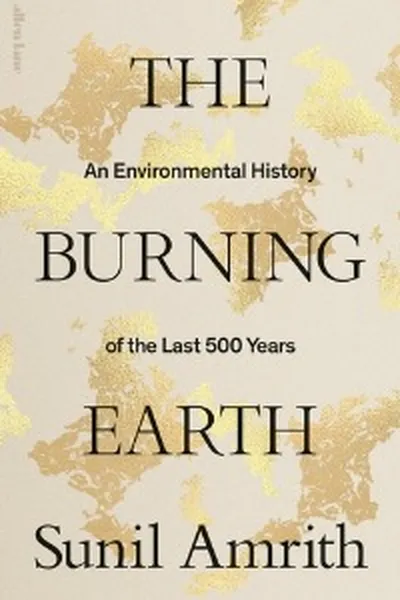尊敬的用户您好,这是来自FT中文网的温馨提示:如您对更多FT中文网的内容感兴趣,请在苹果应用商店或谷歌应用市场搜索“FT中文网”,下载FT中文网的官方应用。
The biggest story of our time is not the US presidential election or Elon Musk’s ego. It is our destruction of the natural world, which places into jeopardy our own future. Sadly, this story is depressing and overwhelming, and therefore not generally the stuff of bestsellers.
我们这个时代最重要的故事不是美国总统选举或埃隆•马斯克(Elon Musk)的自负,而是我们对自然界的破坏,这使我们自己的未来面临危险。可悲的是,这个故事令人沮丧且难以承受,因此通常不会成为畅销书的内容。
It is also, as Sunil Amrith reminds us in The Burning Earth, not a new story. His narrative begins in England in 1217. Two years after Magna Carta, the nobility secured a “Charter of the Forest” that would facilitate their exploitation of land, timber and game. For the rich, the freedom to influence laws went hand-in-hand with the freedom to plunder nature. So it has been ever since.
正如苏尼尔•阿姆里斯(Sunil Amrith)在《燃烧的地球》(The Burning Earth)中提醒我们的那样,这也不是一个新的故事。他的叙述始于1217年的英格兰。在《大宪章》颁布两年后,贵族们获得了一份名为“森林宪章”的文件,这将有助于他们对土地、木材和野生动物的开发利用。对于富人来说,影响法律的自由与掠夺自然的自由是相辅相成的。从那时起,情况就一直如此。
A professor of history at Yale University, Amrith recounts countless episodes of human greed, including the imperialism of Spain, Russia, China, Britain and others; the growth of South Africa’s gold mines, where the suffering of African miners helped to forge London as a financial centre; and the murders of modern-day environmentalists. We have reached planetary crisis because of “our inability to imagine kinship with other humans, let alone other species”. We failed to understand that freedom has “ecological preconditions”.
耶鲁(Yale)大学历史学教授阿姆里斯回顾了许多人类贪婪的事件,包括西班牙、俄罗斯、中国、英国等国家的帝国主义;南非金矿的发展,其中非洲矿工的苦难帮助伦敦成为金融中心;以及对现代环保人士的谋杀。我们面临着全球危机,是因为“我们无法想象与其他人类,更不用说其他物种的亲属关系”。我们未能理解自由具有“生态前提条件”。
The Burning Earth is billed as a “paradigm-shifting global survey of how human history has reshaped the planet, and vice versa”. In truth, it covers some of the same ground as Oxford historian Peter Frankopan did in The Earth Transformed, published early last year. Only by understanding how we have treated the planet in the past can we understand our future, both books argue.
《燃烧的地球》被宣传为一部“改变范式的全球调查,探讨人类历史如何重塑地球,反之亦然”。事实上,它涵盖了牛津历史学家彼得•弗兰科潘(Peter Frankopan)在去年年初出版的《地球的转变》中所涉及的一些内容。这两本书都认为,只有通过了解我们过去如何对待地球,我们才能理解我们的未来。
Amrith does place more emphasis on Asian history. He mentions his childhood in Singapore, whose long-serving prime minister Lee Kuan Yew called air conditioning “the most important invention for us”.
阿姆里斯确实更加重视亚洲历史。他提到了自己在新加坡的童年,新加坡长期担任总理的李光耀(Lee Kuan Yew)称空调是“对我们来说最重要的发明”。
One of the book’s contentions is that, particularly after the advent of fossil fuels, humans wrongly believed that they could be free of nature’s constraints. This framing is intuitively appealing, but Amrith provides little evidence that this is how people thought. He simply states that, by 1900, colonial administrators believed “they had mastered nothing less than life itself”, even though millions died in famines in the 1890s, linked to the El Niño climate phenomenon. The Burning Earth goes on to quote a UN report from 1952 stating that “man can be the master of his environment and not its slave” (this was in the context of reducing infectious disease). But the book is mainly one episode of destruction after another, with only rare titbits about ideas.
该书的一个论点是,特别是在化石燃料出现之后,人类错误地认为他们可以摆脱自然的限制。这种表述在直觉上很有吸引力,但阿姆里斯提供的证据很少,证明人们确实是这样想的。他只是简单地陈述,到了1900年,殖民地行政官员相信“他们已经掌握了生命本身”,尽管在19世纪90年代有数百万人死于与厄尔尼诺(El Niño)气候现象相关的饥荒。《燃烧的地球》还引用了一份1952年的联合国报告,其中提到“人类可以成为环境的主人而不是奴隶”(这是在减少传染病的背景下)。但这本书主要是一个接一个的破坏事件,只有很少关于思想的碎片。
Much of the activity he describes is not humans “escaping” nature, but treating it as a series of exploitable resources. This may have partly reflected people’s belief less in their own greatness than in their own powerlessness. Amrith quotes John Smith, the leader of Jamestown colony in Virginia in the early 17th century, who said of wild animals: “their bounds are so large, they so wilde, and we so weake and ignorant, we cannot much trouble them”.
他描述的许多活动并不是人类“逃离”自然,而是将其视为一系列可利用的资源。这可能部分反映了人们对自己伟大性的不太相信,而更相信自己的无能。阿姆里斯引用了17世纪初弗吉尼亚詹姆斯敦殖民地的领导人约翰•史密斯(John Smith)的话,他说到野生动物:“它们的领地如此广阔,它们如此野性,而我们如此软弱和无知,我们不能太过打扰它们。”


The Burning Earth evokes some lesser-known episodes, including India’s sterilisation of 8mn people in 1976-77, arguably a more brutal approach to population control than China’s one-child policy. It mentions Albert Kahn, a Parisian banker who made a fortune investing in diamond and gold mines, and, before his death in 1940, commissioned a photographic archive of the Earth’s surface “while there is still time”. Even a rich, powerful man like Kahn could not save the natural world; he could only document it. Meanwhile, those following the recent US political row over “childless cat ladies” will smile at how one critic attacked the pioneering environmentalist Rachel Carson: “Why is a spinster with no children so concerned with genetics?”
《燃烧的地球》揭示了一些鲜为人知的事件,包括印度在1976-1977年对800万人进行绝育手术,这种人口控制方式可能比中国的独生子女政策更加残酷。书中提到了巴黎银行家阿尔伯特•卡恩(Albert Kahn),他通过投资钻石和金矿积累了一笔财富,并在1940年去世前委托拍摄了地球表面的照片档案,以记录“在时间还来得及的时候”。即使是像卡恩这样富有、有权势的人也无法拯救自然界,他只能记录下来。与此同时,那些关注最近美国政治争议中的“无子女猫奴”的人会对先驱环保主义者雷切尔•卡森(Rachel Carson)遭到批评的情况感到好笑:“一个没有孩子的老处女为什么如此关心遗传学呢?”
Frankopan’s The Earth Transformed was over 700 pages; The Burning Earth is around 400 pages. Normally I would reach for the shorter book, but here what seems to have been cut is the analysis and nuance. The Burning Earth risks painting all societies as almost equally contemptuous of the poor, the natural world, and non-human animals. China’s Great Leap Forward — in which even the common sparrow was targeted for supposedly eating too much grain — is presented as just an extreme example of human greed.
弗兰科潘的《地球的变革》有700多页,而《燃烧的地球》大约有400页。通常我会选择较短的书,但在这里,似乎被删减的是分析和细微差别。《燃烧的地球》有可能将所有社会描绘成几乎同样蔑视穷人、自然世界和非人类动物的社会。中国的大跃进(Great Leap Forward)——甚至连普通的麻雀也被指责吃掉了太多粮食——被呈现为人类贪婪的极端例子。
The latter section deals with burgeoning environmental consciousness, which Amrith dates post-1970s. The “tragic” feature of environmental politics, he notes with elegance, is “how quickly we went from the stirring of awareness to despair that we might be too late”. He finds hope on university campuses and in young people’s climate strikes, evidence that people are finally standing up to “the self-destructive folly” of the past two centuries.
后一部分涉及蓬勃发展的环境意识,阿姆里斯将其追溯到20世纪70年代之后。他优雅地指出,环境政治的“悲剧”特征在于“我们从意识觉醒到绝望地认为可能为时已晚的速度之快”。他在大学校园和年轻人的气候罢工中看到了希望,这证明人们终于站出来对抗“过去两个世纪的自我毁灭性愚蠢”。
Voices against destruction have existed for centuries, and it’s a shame that Amrith does not seek to explain why they have generally been drowned out. Perhaps the answer is obvious: by definition, defenders of the environment could not marshal the resources that the purveyors of destruction invariably did. If so, are we destined simply to seek out new frontiers to exploit, whether the deep seabed or outer space, to satisfy our greed? Or might we finally turn our unmatched ingenuity to developing a different mode of human flourishing?
反对破坏的声音已经存在了几个世纪,令人遗憾的是,阿姆里斯没有试图解释为什么这些声音通常被淹没。也许答案显而易见:环境的捍卫者无法像破坏者那样调动资源。如果是这样,我们是否注定只能寻找新的开发领域,无论是深海海底还是外层空间,以满足我们的贪婪?或者,我们是否最终会将无与伦比的智慧用于发展一种不同的人类繁荣模式?
The answer depends, in part, on the influence of people like Donald Trump and Elon Musk. They are not the biggest story of our time, but they are episodes in it.
答案在一定程度上取决于唐纳德•特朗普(Donald Trump)和埃隆•马斯克等人的影响力。他们不是我们这个时代最重要的故事,但他们是其中的插曲。
The Burning Earth: An Environmental History of the Last 500 Years by Sunil Amrith Allen Lane £30, 432 pages
《燃烧的地球:过去500年的环境史》苏尼尔•阿姆里斯著,Allen Lane出版社,30英镑,432页
Join our online book group on Facebook at FT Books Café and subscribe to our podcast Life and Art wherever you listen